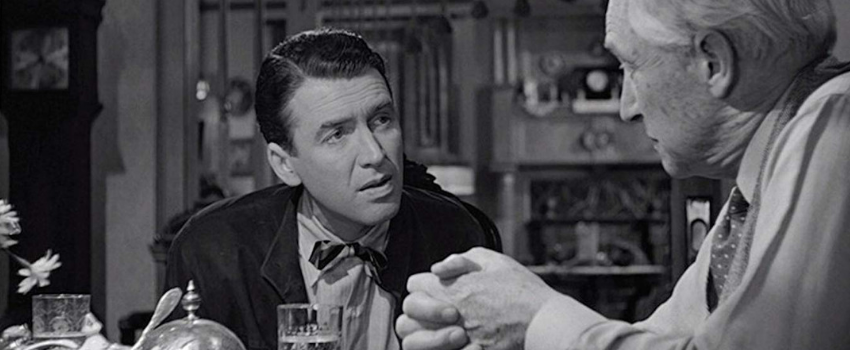
Christmas-time in our house is a time for watching holiday movies. Among my favorites, not only for the Christmas genre but for cinema in general, is Frank Capra’s 1946 black and white classic, It’s a Wonderful Life.
Starring Jimmy Stewart as George Bailey and Donna Reed as his adoring and devoted wife Mary, It’s a Wonderful Life is a film that takes the long view, attempting to show a little bit of heaven’s perspective on how we spend our days, and what matters most in the grand scheme of things.
It’s a Wonderful Synopsis
As the film opens, the angels in heaven are discussing a playback of George Bailey’s life. This playback starts when, as a boy, George saves his kid brother’s life when he falls in a frozen pond while sledding.
Later we see young George daydreaming about adventure and travelling the world. We see him interacting at the drug store with the little girl Mary who will someday grow up to be his wife.
Next, George saves a distraught Mr. Gower from accidentally poisoning a patient by filling a prescription with the wrong pills. Doing so earns George short-term contempt and pain, and slaps across the side of his face at perceived insubordination and laziness before the truth is revealed.
In the midst of this, George even finds time to stick up for his dad during a spat with mean, old, power-hungry Mr. Potter. “He’s not a failure! You can’t say that about my father!”
Fast forward to George as a young man. He still dreams of travelling the world. In fact, he’s just on the verge of it as he picks out a suitcase. Delightedly he learns old Mr. Gower has already picked one out for him, and paid for it – an apparent reward for years of faithful service.
Fast-forward to George and Mary falling in love, and George’s father dying suddenly of a stroke. Amidst a meeting of the Bailey Building and Loan trustees, Mr. Potter makes a crass power play to close down his only competition in Bedford Falls.
A disgusted George says what no one else in the room is willing to and, to everyone else’s astonishment, tells Mr. Potter off. The board votes against Potter to keep the establishment open, but on one condition: George must take his father’s place at the head.
Critical Junctures
This scene, in my opinion, is the film’s linchpin. This is the critical juncture for George when you can see best on his face the dilemma. When before and after he was doing great things, that was well and good. When later he catches himself in disgust just before shaking hands on a lucrative job offer from Mr. Potter, that is merely a continuation. In this moment especially, he must decide more than ever what sort of life he will lead and why. What sort of man will he be?
Yet George’s decision is fraught with consequences, as it must be to qualify as heroic.
Choosing to take his father’s place at the Building and Loan means giving up on travelling the world. Standing up to Mr. Potter and turning down the job offer means earning the contempt and animosity of a very powerful adversary. After all, this is a man who in one brilliant vignette of a scene yells to his secretary “Oh, tell the congressman to wait!”
And the moment of crisis in the film – the reason the angels are watching the reel of George’s life – comes about as a direct result of this.
When Uncle Billy misplaces a great deal of Bailey Building and Loan cash, Mr. Potter sees an opportunity to destroy his foe, and he ruthlessly pounces on it. Placing calls and making insinuations, Mr. Potter himself has found the cash in a newspaper misplaced at his establishment. He knows full-well where the missing money is, but tries to frame George and Billy for fraud and embezzlement.
Panicked at the prospect of prison and the ruining of his family and reputation, George Bailey seriously considers committing suicide.
Now what kind of Christmas movie is that? If you ask me, it is the very best kind.
Grace v. Despair
Mr. Potter is as good a stand-in for the Devil here as any, lying and scheming, and trying to dominate everyone and everything. And George’s crisis – the one which almost drives him to take his own life – comes from allowing this adversary to get in his head.
Yet heaven intervenes, granting George an impulsive wish. The angel shows George what life would be like without him. That is when it suddenly dawns on the distraught protagonist that he has lost sight of what matters most in God’s economy – love, grace, and truth.
In the end, overcome by a flood of truth and sentiment, George cries out, “Please, God, let me live again.”
And this is why I say It’s a Wonderful Life is exactly what a Christmas film should be.
The original Christmas story was and is about God’s holy grace and love prevailing against evil, death, and despair. In truth, sin, death, and Satan had us dead to rights. Yet at the critical juncture, Christ interceded for us, laying aside his glory and suffering on our behalf.
The baby Jesus born in a manger was a gift of hope to those crushed beneath the weight of their transgressions and the curse of sin. Yet Jesus came not only to free us, but to suffer. And the choice any Christian makes to place their trust in Jesus must needs-be involve following after Jesus, even in suffering.
As Jesus said in Luke 9:23, “If anyone would come after me, let him deny himself and take up his cross daily and follow me.”
Christmas, then, cannot be about fake happiness. Rather, Christmas must be portrayed as a matter of choosing life over death, and of God’s grace and love triumphing over malice and contempt.